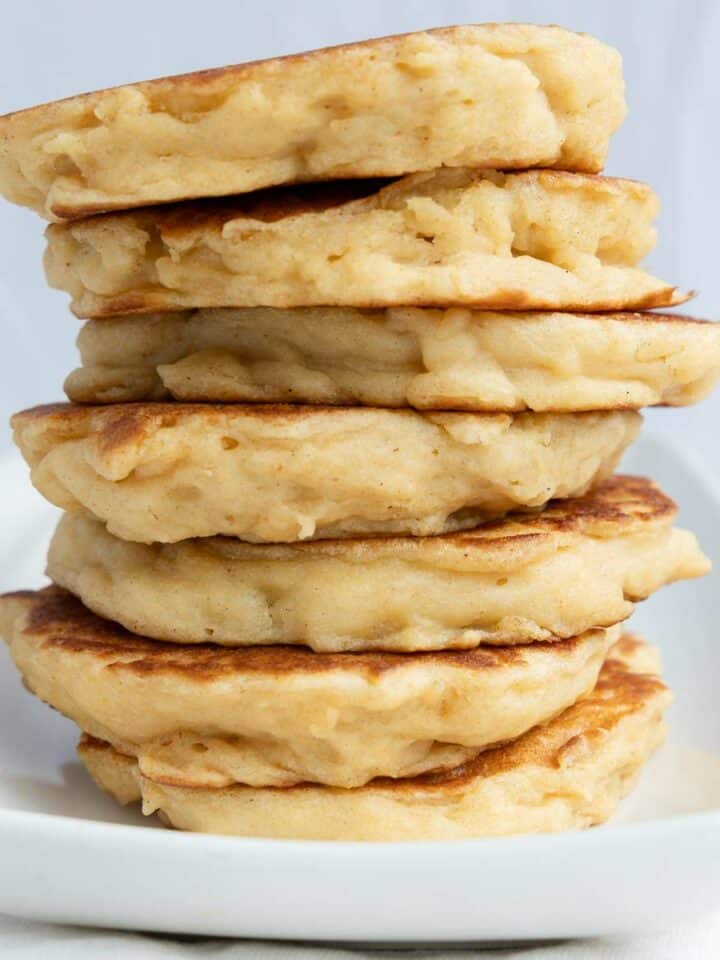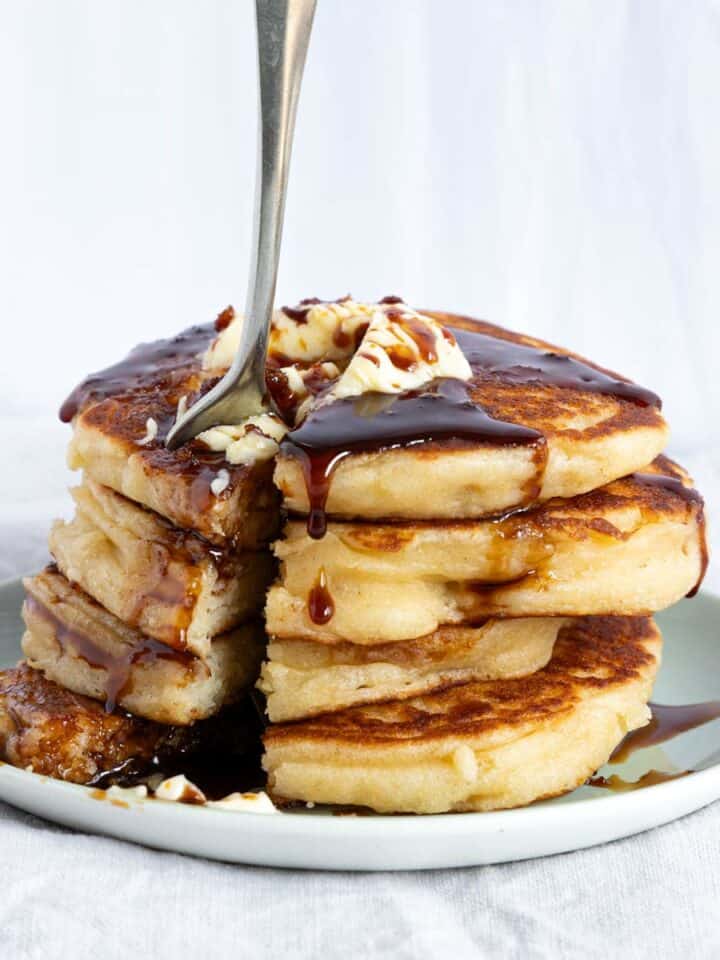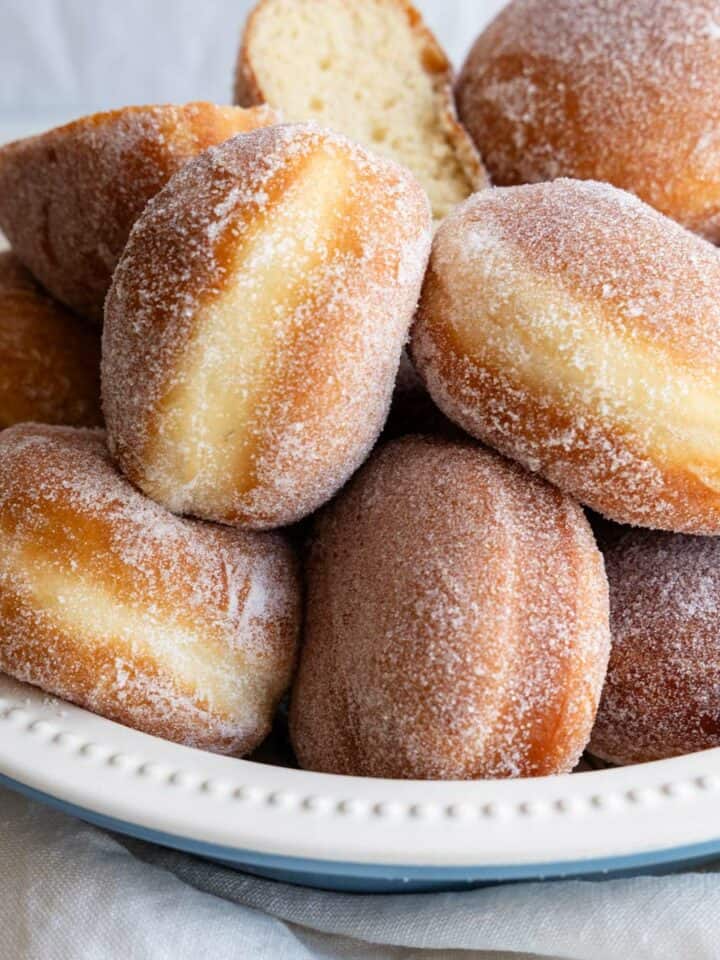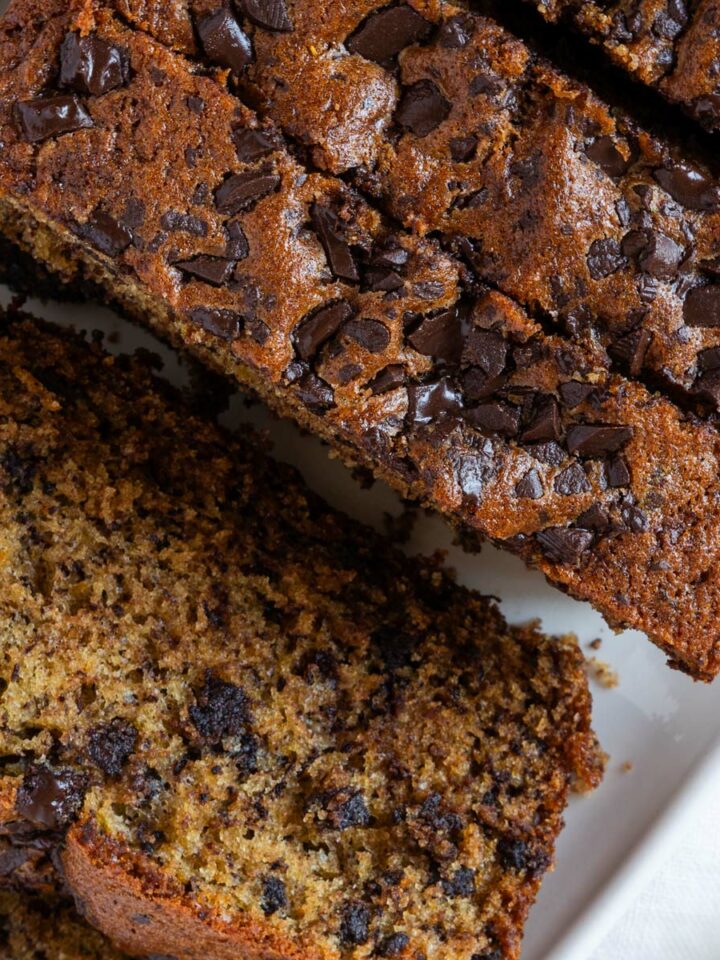Jump to Recipe

Spring has officially started, yet we have decided to stick to comforting winter meals for a bit longer. Today we are testing Cottage Pie, another classic British dish.
It was Mary Berry's cottage pie with dauphinoise potatoes that caught my attention this time. I especially liked her spin on a traditional English dish by adding a French factor to it.
The recipe comes from BBC Food, but it was initially published in the cookbook 'Mary Berry Cooks'.
What happened when we tried it?
- There are some easy ways to substitute some of the ingredients.
- It was difficult to choose the right size oven dish based only on the volume information given.
- The meat doesn’t want to brown when cooked in one go.
- It’s easy to over-boil potatoes.
- Make sure you have 3 spare hours, it takes time to make this cottage pie.
- We enjoyed the golden-brown topping made from dauphinoise potatoes more than traditional mash.
- This meal made 2 dinners for our family of four (2 adults and 2 children), but it doesn’t make 8 adult servings.
In the rest of the post, I will break these down further, along with a few of my own suggestions on how I’d foolproof the recipe.
- How to Substitute the Ingredients in Mary Berry's Cottage Pie
- Yield/Portions
- Equipment
- Step by Step Method
- What Can Go Wrong
- Scaling Mary Berry's Cottage Pie
- Cooking Time and the Recipe Difficulty
- What to Serve with Cottage Pie
- How to Store Cottage Pie
- How to Turn Mary Berry's Cottage Pie into a Free-from Meal
- The Verdict on Mary Berry's Cottage Pie with Dauphinoise Potatoes
- The Recipe Card
How to Substitute the Ingredients in Mary Berry's Cottage Pie
When I find a new recipe, I always skim through the ingredient list first. Missing too many ingredients from the list can be discouraging. However, there are often replaceable components, so it's always good to look for suitable substitutions.
You can easily substitute the King Edward potatoes, chestnut mushrooms, muscovado sugar, cheddar cheese and thyme in this recipe. I even believe it's safe to replace ingredients that work as flavour enhancers and accent the meal’s taste - in this case - the red wine and Worcestershire sauce.
Be mindful, though. Making too many changes will significantly alter the recipe.
King Edward potatoes
The best way to substitute floury King Edward potatoes is to use a variety that has the same properties. The most common are Maris Piper potatoes or Desirée.
Because of their floury, fluffy texture, these varieties are perfect for dauphinoise potatoes, jacket potatoes, roasting and mashing.
Chestnut mushrooms
You can always switch chestnut mushrooms for button mushrooms or portobello mushrooms.
Did you know that all three are actually the same type of mushroom formally known as Agaricus bisporus? These mushrooms can have two colours - white and brown. Agaricus bisporus is most often sold and consumed in its premature state as (white) button mushroom or (brown) chestnut mushroom. Mature Agaricus bisporus with a large open cup is known as portobello mushroom.

Cheddar cheese
In case you can't get hold of cheddar (it's not the most popular cheese outside of the UK), use any cheese that is easy to grate and melts nicely. My choice would be Gouda, Mozzarella or Edam. Eventually, you can try other British cheeses like double Gloucester and red Leicester.
Thyme
You can substitute dry thyme with other dry herbs like oregano, marjoram or mixed herbs. You can also use fresh thyme in case you have it.
Light muscovado sugar
Brown sugar and caster sugar are both safe choices when substituting light muscovado sugar in this recipe.

Red wine
If you are in a pinch and don't have red wine, you can substitute it with beef stock.
However, replacing it will have a subtle effect on the colour and taste of the finished dish. Wine enhances the flavours and aromas of the other ingredients. I can always tell the difference when it's in the recipe.
Worcestershire sauce
To replace Worcestershire sauce, you can experiment with soya sauce and balsamic vinegar. My suggestion is 1 tablespoon of light soya sauce and 1 teaspoon of balsamic vinegar for each tablespoon of Worcestershire sauce.
I am usually careful with Worcestershire sauce and add less than is recommended. It's my personal preference.
Nevertheless, I've learnt that this sauce is quite popular in the UK. Many British chefs are using it in their recipes. For example, Hairy Bikers have several dishes containing Worcestershire sauce. One of them is their Sausage casserole we tested a while ago. You can read about the recipe in our post: Hairy bikers sausage casserole / tried & tested.
Gravy browning
I have never come across a recipe asking for gravy browning, so I needed to research what exactly it was. I've learnt that it is used to give the gravy a darker brown colour and it contains mainly molasses and spices.
I decided not to use it as Mary Berry says it's optional.
Click to See the Ingredients and Their Substitutions
| Ingredients | Substitutions |
| King Edward Potatoes | Maris Piper, Desirée |
| Chestnut Mushrooms | Button Mushrooms, Portobello Mushrooms |
| Light Muscovado Sugar | Brown Sugar, Caster Sugar |
| Cheddar Cheese | Double Gloucester, Gouda, Edam |
| Thyme | Oregano, Marjoram, Mixed Herbs |
| Red Wine | Beef Stock |
| Worcestershire sauce | Soya Sauce Combined with Balsamic Vinger |
| Oil | Any Frying Oil |
| Beef Mince | - |
| Onions | - |
| Cellery | - |
| Plain Flour | - |
| Beef Stock | Any Stock |
| Gravy Browning (optional) | - |
| Double Cream | - |
| Salt | - |
| Pepper | - |
Yield/Portions
According to the BBC website, this recipe serves 6-8 people.
You can confidently feed six or make 7 smaller portions. However, I don't think this recipe makes 8 adult servings!
It all depends on how much your family likes to eat, and if you are having any starters before the main course. If the portions look small, make sure you have additional sides like Yorkshire puddings and braised vegetables.
The size of the oven dish will also determin how many servings you can devide this meal into.

Equipment
Mary Berry recommends a 2.4 litre/4 pint ovenproof shallow dish.
I don't think it's helpful recommending a dish by its volume, something Mary Berry does in most of her recipes. Knowing the dimensions gives me a better idea about the size I need.
I eventually picked an oven roasting dish with the inside measurements of 35 x 25 x 5 cm, similar to this large Pyrex glass rectangular roster from Amazon.
Other equipment you will need include:
- cooking pot (to cook potatoes)
- larger frying pan with a lid or casserole dish (to make the minced meat)
- a small bowl (to mix flour and wine)
- grater (to grate the cheese)
- knife and chopping board
- potato peeler
- colander (to drain cooked potatoes)
Step by Step Method
Step 1
Fry the beef in the frying pan until golden brown and set aside.
Notes: Cooking the meat all in one go releases lots of liquid, making it difficult to brown the meat.
Tip: To brown the meat nicely, fry it in smaller batches on a pretty hot large frying pan.
Step 2
Use the same pan for frying the onion and celery. Fry until the vegetable starts to soften and return the meat to the pan.
Step 3
Whisk the wine and flour in a bowl to create a smooth mix, then whisk in the stock and add the liquid to the pan together with Worcestershire sauce, sugar and thyme.
Step 4
Bring to a boil and stir regularly while the sauce is thickening.

Step 5
Add mushrooms and gravy browning (optional); season with salt and pepper.

Step 6
Cover the pot with a lid and simmer for 45 minutes.
Notes: When simmering the meat for the recommended 45 minutes, I needed to add more liquid to the sauce and occasionally stir as the flour had a tendency to stick to the bottom.

Step 7
Cook the potato slices in boiling salted water for about 4-5 minutes. Carefully drain the potatoes and let them cool down a bit.
Notes: This particular step confused me. I automatically inserted potato slices in cold water, brought them to a boil, and left them in boiling water for 5 minutes. Unfortunately, I over-cooked them, and they became too soft.
Tip: To prevent over-cooking blanch the potatoes instead:
Bring water to a rapid boil. Carefully insert potato slices into the water, give them a stir or two, and cook for 5-7 minutes with the lid on.
Step 8
Preheat the oven to 220C/fan 200C/Gas 7.
Step 9
Cover the bottom of the oven dish evenly with the cooked cottage pie filling. Arrange half of the potatoes on top. Season with salt and pepper and pour over half of the cream.
Place the other half of the potatoes on top of the first layer. Season again, pour over the rest of the cream and sprinkle with the grated cheese.
Step 10
Bake in the oven for around 30 minutes or until the top is golden brown.

What Can Go Wrong
It's super disappointing when a new recipe doesn't turn out according to plan. Sometimes it's down to my own fault, like not paying enough attention to the instructions. However, in some instances, the directions are incomplete and don't provide adequate information.
Browning the meat
The recipe directs us to brown the meat without any other explanation. I discovered that the trick is to brown the beef in small batches instead of trying to do it all in one go.
Adding a large amount of meat into the pan reduces the temperature inside. Therefore, the meat will stew in its own juices, not fry, and become pale and tough.
Instead, divide the meat into 3 - 4 portions and fry them separate in a large pan on high heat. It's good if the meat doesn't cover the whole surface.
Over-cooking the potatoes
To arrange the potatoes neatly over the top of the cottage pie (as you can see on the BBC recipe image), the potatoes must hold their shape.
You can see from my picture that I had a bit of a struggle with that. My first Mary Berry cottage pie ended up with crushed potato topping!

I wish the steps in the recipe were a bit clearer and more explanatory. It states: 'Cook the potato slices in boiling salted water for about 4-5 minutes - the potatoes need to be soft. If the potatoes are too hard, they will be waxy, and the cream will run off them.'
Should I blanch the potatoes, or can I insert them into cold water and bring them to a boil? I picked the latter, but it didn't work.
After a few tests, I concluded that blanching is the safest way to prevent over-cooking.
To add more confusion, the recipe also says the potatoes need to be soft. But I found that once they are soft, they fall apart too easily.
The potatoes need to be drained once they start softening on the surface, not when they are already soft.
Inserted into cold water and brought to boil Blanched potatoes
Scaling Mary Berry's Cottage Pie
It's easy to scale the recipe if you know how much of the ingredients you need for one person. To find out, divide each ingredient by the number of servings the recipe makes.
In this case, I divided the main ingredients (the meat, cooking liquids and starches) in the list by 7. It gave me the minimum amounts needed per person.
Click to see the Ingredients per Person
| King Edward Potatoes | 214g |
| Chestnut Mushrooms | 36g |
| Light Muscovado Sugar | - |
| Cheddar Cheese | 14g |
| Thyme | - |
| Red Wine | 36ml |
| Worcestershire sauce | - |
| Oil | - |
| Beef Mince | 129g |
| Onions | - |
| Cellery | - |
| Plain Flour | 7g |
| Beef Stock | 43ml |
| Gravy Browning (optional) | - |
| Double Cream | 21ml |
| Salt | - |
| Pepper | - |
Once you know how much of the main ingredients you need per person, all the other flavourings (Worcestershire sauce, thyme) and aromatic vegetables (onion, celery) can be adjusted by eye.
Make sure you are using an appropriately sized dish too. Smaller if you are downsizing and larger if you are increasing the amounts.
Cooking Time and the Recipe Difficulty
Making Mary Berry's cottage pie with dauphinoise potatoes took me over 2.5 hours. The recipe contains several steps you need to do before putting the pie in the oven, so be warned that this isn't a low effort, quick meal.
Making the recipe involves:
- preparation - chopping, slicing, etc. (25 minutes)
- frying the meat in batches (20 minutes)
- thickening and cooking the cottage pie beef filling (50 minutes)
- blanching and cooling the potatoes (30 minutes)
- assembling the dish (20 minutes)
- and finally baking in the oven (30 minutes)
The instructions aren't complicated. What you need is time to put the meal together and bake it. To be more efficient, you can overlap some of the steps. I managed to blanch the potatoes and cool them down while the beef filling was simmering in the pot.
Make sure you have 3 hours of spare time to make this dish, and you'll be fine.
What to Serve with Cottage Pie
Boiled or blanched vegetables are a great side dish to accompany the cottage pie. You can blanch some green peas, broccoli or green beans, or you can cook a few carrots and serve them on the side.
If you don't want to spend more time cooking, a salad would be another good option.
Additionally, if you need to stretch the meal, include Yorkshire pudding with each serving to bulk it up.
How to Store Cottage Pie
Made ahead
You can bake the cottage pie ahead, let it completely cool down and store it covered (with a lid or cling film) in the fridge. You might even find that it tastes better after a day or two. Chilled cottage pie will be easier to cut into uniform portions too.
Leftovers
If you have any leftovers, store them in an airtight container in the fridge for a maximum of 4 days.
Freezing
Mary Berry doesn't recommend freezing her cottage pie, and I agree. From my experience, the cooked potatoes don't taste their best after defrosting. Freezing breaks their structure, and they become watery.
Alternatively, you can pre-cook and safely freeze the cooked minced beef and defrost it once you want to make cottage pie. It saves you half of the cooking time.

How to Turn Mary Berry's Cottage Pie into a Free-from Meal
To turn this cottage pie into a gluten-free and lactose-free recipe, pay attention to the ingredient table below. I included some of my favourite alternatives too.
| Ingredients containing gluten | Gluten-free substitutions |
| Plain Flour | Doves Farm Gluten Free Plain Flour |
| Beef Stock | Gluten-free Version/Supermarket |
| Worcestershire Sauce | Gluten-free Version/Supermarket |
| Gravy Browning | - |
| Ingredients containing dairy | Lacto-free substitutions |
| Double Cream | Creamy Oat Oatly |
| Strong Cheddar | Applewood Vegan Smoky Cheese Alternative |
Please note that the changes I suggest are aiming to help people who are sensitive to lactose or gluten, and they might not be suitable for people with an allergy!
The Verdict on Mary Berry's Cottage Pie with Dauphinoise Potatoes
This cottage pie is different from what you might know. The recipe contains a good amount of celery and chestnut mushrooms, both adding bold earthy, broth-like flavours, enhanced by red wine and Worcestershire sauce.
Instead of mashed potatoes, Mary Berry tops the dish with French dauphinoise potatoes (her version of them). We liked the contrast between the mincemeat and the potato layer, and all flavours compliment each other.
Rating the taste of any dish is subject to personal preferences. We had a bit of discussion about this cottage pie with my husband. According to him and our elder son, it was 'the best cottage pie ever'; I thought it was a lovely meal but didn't feel it was the very best one.
➤ Overall, the dish is fun, and I like Mary Berry's tweaks that set it apart from other classic versions. In the end, we decided to give it a fantastic 9/10 for its taste, however only 7/10 for its instructions.
The Recipe Card
Mary Berry's Cottage Pie with Dauphinoise Potatoes
Ingredients
- 1 tablespoon oil
- 900 g beef mince
- 2 onions chopped
- 4 sticks celery diced
- 50 g plain flour
- 250 ml red wine
- 300 ml beef stock
- 2 tablespoon Worcestershire sauce
- 2 tablespoon light muscovado sugar
- 1 tablespoon thyme dry or fresh
- 250 g small brown chestnut mushrooms sliced
- dash of gravy browning optional
- salt and pepper
- 1.5 kg King Edward potatoes peeled and cut into 4mm slices
- 150 ml double cream
- 100 g strong cheddar grated
Equipment
- oven roasting dish with the inside measurements of 35 x 25 x 5 cm
- Cooking pot
- larger frying pan with a lid or casserole dish
- a small bowl
- grater
- knife and chopping board
- potato peeler
- colander
- utensils
Instructions
- Fry the beef in the frying pan until golden brown and set it aside. It helps if you do it in smaller batches in a large, fairly hot pan.
- Use the same pan for frying the onion and celery. Fry until the vegetable starts to soften and return the meat to the pan.
- Whisk the wine and flour in a bowl to create a smooth mix, then whisk in the stock and add the liquid to the pan together with Worcestershire sauce, sugar and thyme.
- Bring to simmer and stir regularly while the sauce is thickening.
- Add mushrooms and gravy browning (optional); season with salt and pepper.
- Cover the pot with a lid and simmer for 45 minutes. Add more liquid if needed and occasionally stir as the flour tends to stick to the bottom.
- Bring water to a rapid boil. Carefully insert potato slices into the water, give them a stir or two, and cook for 5-7 minutes with the lid on. Carefully drain the potatoes and let them cool down a bit.
- Preheat the oven to 220C/fan 200C/Gas 7.
- Cover the bottom of the roasting dish evenly with the cooked meat filling. Arrange half of the potatoes on top. Season with salt and pepper and pour over half of the cream. Place the other half of the potatoes on top of the first layer. Season again, pour over the rest of the cream and sprinkle with the grated cheese.
- Bake in the oven for around 30 minutes or until the top is golden brown.

















Leave a Reply